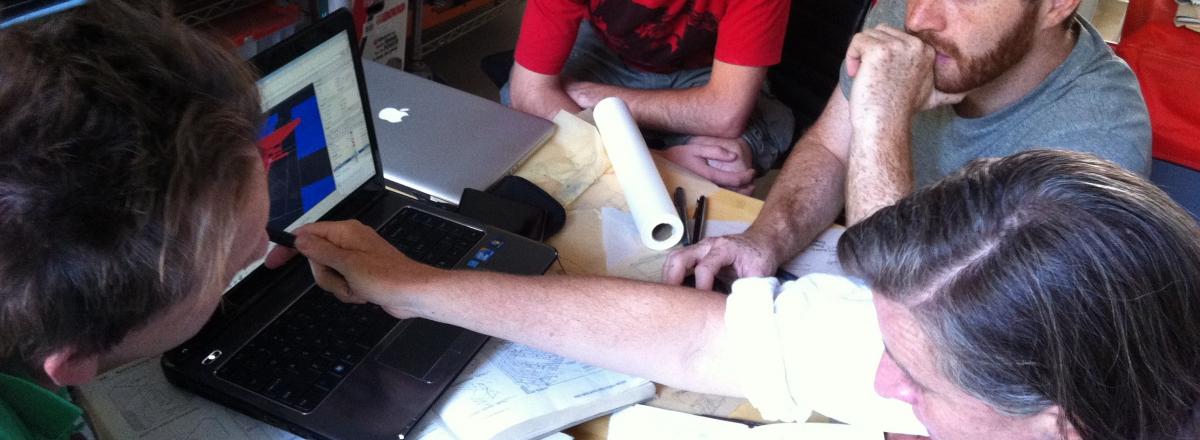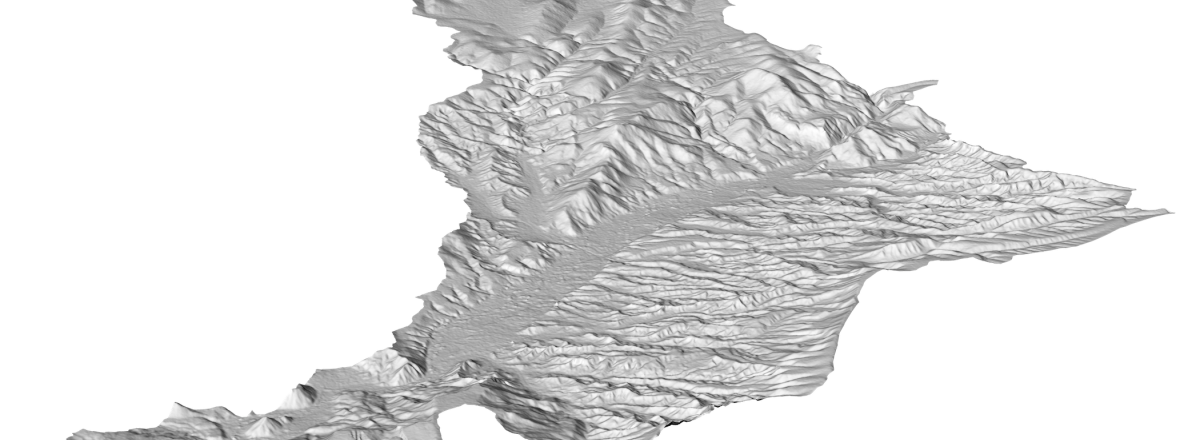MSArch in Drylands Design
Overview
The ALI Master's of Science in Architecture (MSArch) with a focus on Drylands Design is a one-year post-professional degree produced with and for public benefit. Integral to your studies will be the conception, research and development of design solutions that serve as a bridge between science and public policy. ALI design teams make use of advanced tools for new analysis of natural and human systems, new readings of landscapes and cities, and new directions for shaping space in drylands.
The ALI MSArch is situated within a well-defined research agenda funded in part by public agencies, including the US Dept of Housing and Urban Development/Office of University Partnerships; the Environmental Protection Agency Clean Water Act; and the Bureau of Reclamation’s World Water Forum College Grants, administered by the Metropolitan Water District of Southern California, the largest water wholesaler in the US West.
As a program in the public trust, ALI seeks graduate students willing to engage sound science; grapple with history; critically question cultural norms and current policy; make a convincing case for new directions and anticipate obstacles to the implementation of (sometimes radical) change. As an experimental program, ALI seeks students seeking to expand design's affective bandwidth and willing to push disciplinary boundaries. Architectural, landscape, public art, infrastructural, policy, and urban design propositions are welcome.
Course of Study
The ALI MSArch is a 3-semester thesis comprising research, design, and synthesis/dissemination. Open to qualified candidates already holding a first professional degree in architecture or landscape architecture, the ALI MSArch invests intensively in GIS-based research and analysis in Semester 1; generating and testing strategic design proposals in Semester 2; and preparing proposals for public dissemination in Semester 3. Final thesis outputs may take the form of a publication, an exhibition, a website, a design-build project; the medium is determined by students in consultation with their advisors.
We encourage all students to build fieldwork into their course of study. A sample sequence of coursework in the ALI MSArch might look like this:
Summer
Fundamentals of GIS: Groundwork Summer Workshop.
This two-week intensive seminar provides basic GIS concepts and techniques with emphasis on spatial information management, analysis, interpretation, map generation and display using GIS software packages.
Fall
Geospatial Technologies and Advanced Spatial Analysis for Designers: Thesis Research Studio. Required. 6 units.
Within a well-defined research focus on land uses and water management in the Los Angeles basin, this course provides the practical training necessary to investigate spatial patterns resulting from coupled natural and human systems. Students will work in a lablike envioronment on a shared mapping/modelling project. Students will gain a working knowledge of remote sensing, global positioning systems, geographical distribution and spatial autocorrelation, regression analysis, network connectivity, interpolation and geostatistics, and surface and three-dimensional analysis. Pre-requisite: Groundwork GIS training or equivalent.
GIS and Urban Design Theory: Thesis Prep Seminar. Required. 3 units.
Delivered parallel to the Thesis Research studio, this seminar provides a critical context for generating design vision out of geospatial analysis. Students will be introduced to urban design theories and case studies, and asked to interpret, reflect on, and test preliminary findings from their Thesis Research studio. Students in the Thesis Prep seminar will identify and articulate specific challenges and sites of interest within the ALI research agenda, and produce a thesis proposal to be developed the following semester in Thesis Design studio.
ALI Policy Lab 1: Understanding the Urban Metabolism: Science, Policy, and the Landscape of Resilience. Required. 3 units.
Led by a team of instructors from science and policy, students survey the terrain of current water, energy, and climate policies, as they bear on design of the built environment in drylands. The course uses case studies to critically evaluate planning documents and identify opportunities for amplifying and accelerating climate change mitigation goals through strategic planning and design of the built environment. While maintaining a particular focus on water use, water systems, and the interdependency of water and energy, the seminar places those issues in the context of other planning challenges, including density, transit, and food policy.
Drawing on History: Water Infrastructure and Urban Form. Required. 3 units.
This seminar is a hybrid history and representation course. Focusing on case study sites in India, the Middle East, the Mediterranean, and the New World, students will examine the role of water engineering in shaping city form. Lectures, discussion, and drawing exercises will explore how public water systems have shaped (and been shaped by) ritual, hygiene, gender roles, technology, governance, the marketplace, and political power.
Spring
GIS Applied: Thesis Design Studio. Required. 6 units.
This studio challenges the design student to actively translate geospatial analysis into design vision at the architectural, infrastructural, and/or urban scale. Design projects will reflect well-defined individual interests within the ALI research agenda; demonstrate understanding and application of concepts in geospatial analysis; and convey clear and meaningful connections between problem definition, evidence, analysis, and design vision.
ALI Policy Lab 2: Recalibrating the Urban Metabolism: How to critique, draft, and advocate policy change. Required. 3 units.
Led by policy experts, this seminar teaches students to read, evaluate, and critique policy and to draft policy recommendations. Within the focus area of the water, energy, and climate nexus, students will identify particular policies and practices related to their individual thesis projects and craft written policy recommendations to accompany it.
Elective seminar. 3 units. Choose from history, theory, media and technology, design, business, and service-learning course offerings from across disciplines.
Summer
ALI MSArch students may choose to complete their third and final semester in the Summer term, in the Fall Term, or distributed over both. For example, students may choose to use their Summer term for foreign travel; professional experience; paid research internships; for-credit (3 units) fieldwork, practicum, elective seminar, or independent study; or a combination. Students who choose this option would then return to complete their final thesis studio in the Fall term. Alternatively, students may complete their course of study in the Summer term.
FINAL SEMESTER: Summer or Fall
Synthesis Studio. Required. 6 units.
In the final semester, ALI students in the MSArch program will integrate their geospatial research, design proposals, policy recommendations, and case studies derived from history, theory, and field work and prepare it for public dissemination. Depending on the student’s area of interest, career aspirations, and intended audiences, the vehicle and medium for public dissemination will vary. Some students will build websites or applications; others will produce an exhibition; others may prepare a publication and lecture; others may produce and document a design-build demonstration project. ALI MSArch final thesis projects are comprehensively documented, archived, and made available to the public as an ongoing resource for drylands design.
Total units required for graduation: 36
Internship Development Program (IDP) hours:
Students may earn up to 930 supplemental experience hours towards NCARB's Intern Development Program (IDP) by successfully completing ALI's Master's of Science in Architecture conferred by Woodbury University's fully-accredited School of Architecture. See NCARB's list of approved advanced degree programs that qualify for IDP: Supplemental Experience.
APPLY:
ALI's MSArch degree is offered through Woodbury University School of Architecture's graduate program.
For admission to the ALI MSArch in Drylands Design, see application requirements here.





